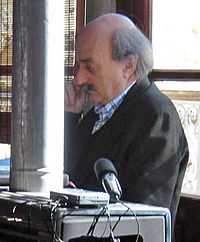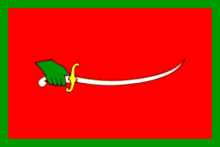Jumblatt family
The Jumblatt family (جنبلاط in Arabic, originally Kurdish Janpoulad (جانپولاد)(meaning "steel-bodied"), also transliterated as Joumblatt, Junblat and Junblatt) is an influential Druze family who settled in the Lebanon mountains (coming from Syria) around the 15-16th century, fleeing persecution from the Ottoman governor.
Tradition holds the Jumblatt family to be the leaders of the Kaysi Arabs who fought a bitter war with the Yemeni Druze in the Battle of Ain Darra of 1711.
Current

Today, Walid Jumblatt is one of two principal leaders of the Druzes (an influential religious community found in the Arab World, known for its internal solidarity, the highly spiritual and philosophical orientation, and its influential position in Lebanese politics). His son, Taymoor, is being prepared to follow his father's footsteps in the political scene in the future. After the assassination of the Lebanese prime-minister Rafik Al Hariri, Walid Jumblatt preventively protected his children by sending them to France.
History

Walid's father, Kamal Jumblatt, a major political, cultural, and philosophical figure in the Arab World, and a prominent Arab nationalist, was assassinated in 1977 in the Lebanese mountains.[citation needed] Kamal's own father, Fouad Jumblatt, was himself assassinated on August 6, 1921.
Kamal Jumblatt was a respected political leader.[citation needed] Allegedly, on his bedroom wall he held the pictures of Jesus and Mahatma Gandhi. He was a rebellious figure and despite his descent from an aristocratic family, he supposedly lived a simple life neglecting the wealthy lifestyle that other political figures boasted at the time. Kamal Junblat was well-educated and quite attracted by the arcanes of Far Eastern philosophy; he wrote many books, touching on very diverse subjects from philosophy, spirituality, macrobiotics etc. It is claimed that he embraced meditation and practiced it often.
Jumblatt played a role in Lebanese history. Mrs. Nazira Jumblatt (mother of Kamal) kept the dynasty alive, in a time when it was hard for women to play a political role. Before that, Sheikh Bashir Jumblatt was assassinated, during times of confrontation with the prince Bashir II, where a saying had spread at the time: El Chouf ma betse3 bashirein, which means the Chouf province cannot handle two opposing leaders.. In addition, Khaled Jumblatt, a distant cousin of Walid Jumblatt, held the position of minister of economy and was a prominent politician in Lebanon for many years until his death in 1993.
Cultural References
Samir Habchi's 2003 documentary film Lady of the Palace examines the history of the Jumblatt family from the 17th century onwards. The film focuses on the life of Nazira Jumblatt and the late nineteenth/early twentieth century.[1]
References
- ↑ "Lady of the Palace." http://www.imdb.com/title/tt0794307/. Retrieved 22 August, 2013.